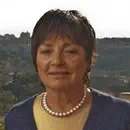
The year we made aliya, I was asked to speak at my son's school about what affected me the most about living in Israel. My love for studying Tanach (The Hebrew Bible), which began long before I actually moved to the Jewish state, is what made me omit the scenic views, people and so much else, to speak about my excitement at seeing road signs – normal, ordinary road signs with arrows and miles to go on them – on which were written destinations such as Hebron, Beersheba, Tzor'a, Eshte'ol, Ashdod etc
Signs for places like Tel Aviv, Haifa and Hadera, built by idealistic and self-sacrificing modern Zionist pioneers, left me cold. I loved the signs with the names of Biblical geographical locations, the smaller ones possibly not in the exact spots they were millennia ago, all now taken for granted after 2000 years of exile! What seemed unbelievable to me at first was that drivers didn't stop to take pictures of the place names taken from the Bible that made me so emotional, but I told the youngsters that after thinking about it, I realized that everyone's just driving by the signs meant that the Jewish state is real and here to stay.
Because the Jewish people are simply continuing where they left off. After all, Abraham must also have looked for the signs directing him to Hebron and Beersheba, while Samson knew he was somewhere "between Tzor'a and Eshtaol" when the Spirit of Hashem began to move him, the Philistines probably saw a road sign helping them find their way home to their five cities including Ashkelon and Ashdod - and no one in ancient times found that exciting either.
Actually the entire Hebrew Bible is a road sign, one showing travelers how to make their journey on the road of life a worthwhile and productive one for the individual and society. We do have to put in the time needed to understand it, not on a superficial level, but by reading the many brilliant commentaries on the narrative as well as the codes of law that explain the practical application of its commandments. It is always time well spent and there is always something new to learn.
Israel, naturally, is the Land where the Tanach comes alive, in names of streets, towns and cities, in ancient sites, archaeological finds and in Biblical phrases and verses that are well worn idioms. There is an annual international Bible Contest, one for youngsters on Israel Independence Day and even one for adults. Ben Gurion famously called the Tanach the Jewish people's real estate contract.
Educators, however, complain that as opposed to religious schools where it is a major subject with much written on how best to teach it, non-religious youngsters know less and less Bible, weakening their respect for it, their sense of historic connection to the land and attachment to the Jewish people. In the era of minimalistic whatsapp language, many do not want to make the effort to understand the Bible's language, which demands an effort similar to what which is required for English speakers to read Chaucer and Shakespeare. The Israel Education Ministry has, at least, initiated programs to impart Tanach to the general public via the internet, while in America, except for Jewish schools, it seems a lost cause.
On the other hand, one does hear allusions to the Bible, but it is well known that "the devil can quote Scriptures" and the way he does it is by being either sacrilegious or not realizing that he is just plain ignorant. Obama's 2006 speech in which he alludes to slavery and stoning in the Bible, egregiously telling people to read it, although it is obvious he had not understood what it is he did read, is a blatant example.
In the West, says Ann P. Levin, author of the recent book, Burning but Never Consumed, the Bible (Christian version) once found in every hotel room, is criticized or attacked in partial quotes with no context or downright mockery. This happens in entertainment, the political arena, academia, the media and as expected, is prevalent among todays's atheists, humanists and progressives.
Levin, a former attorney who practiced criminal and family law in the USA before moving to Israel and teaching legal English in various Israeli universities, describes this trend and finds it appalling. Galvanized to action, she decided to do something about the lack of respect for the Hebrew Bible, also called the Book of Books and the lack of knowledge of its meaning and depth. Although she personally believes in the Hebrew Bible's G-d-given holiness,, she bases this book on the need for its timeless universal messages, saying that "we are losing the level ground of our civil society. This seems to have come suddenly, but it is a long time in the making. Many are scrambling for an anchor, spiritual and intellectual" – and that anchor, she posits should be and can be the Hebrew Bible.
![Burning But Never Consumed: The Hebrew Bible in Turbulent Times by [Ann Levin]](https://m.media-amazon.com/images/I/51ObCl9ZzoL.jpg)
In this most readable book, Levin describes the trend that leaves us bereft of eternal Biblical values and wisdom, and furnishes a thorough rebuttal by analyzing nine common fallacies in understanding the Bible. In clear and forthright style, she puts paid to the lack of exposure and misinterpretation causing the West's estrangement from its roots.
The interesting and well chosen fallacies conerning which Levin enlightens readers include cherry picking to make a point, the fallacy of incorrect translation and the silliness of nonsensical literary reading, as well as the mistakes in understanding made by ignoring the Bible's literary structure and in not learning its geography.
Reading the examples and careful analysis of these errors, I was reminded of how world-renowned Israel Prize Laureate Bible Professor, the late Nechama Lebowitz complained that the mimeograph machine (anyone remember what that was?) ruined Bible education because teachers copied verses for students without their context, leading to Biblical ignorance and misinterpretation. She claimed that students misunderstood what they were reading without the accompanying explanations found in the real texts. The book's author clearly would agree.
Levin thoroughly refutes the baseless contentions that science and Bible don't mix and that archaeology disproves the Bible. She is enlightening on the pitfalls of reading ancient texts with 21st century eyes, and the lack of understanding and appreciation for the Bible's honesty in relating life experiences.
The book also brings a clear and convincing explanation of slavery as described in the Hebrew Bible, a most important and falsely quoted topic nowadays, when instead of connecting the liberation of the Exodus with the Emancipation Proclamation as did the freed slaves living at the time, those progressives reading the Jewish Bible use it to accuse Judaism of promoting slavery.
(In that vein, the quotes at the start of each chapter are well chosen and readers will enjoy them, although I would like to believe that George Gershwin did not really mean to denigrate the Bible when he used the tune for Torah blessings, recalled from his Bar Mitzva, in the Bible-story-negating "It ain't necessarily so." It seems to me an instance of gentle humor in the context of Porgy and Bess' milieu. By the way, has he been cancelled yet?)
A lover of Tanach study all my reading life (and even before that, since my learned and beloved father z"l used to lull me to sleep with the Midrashic stories on Biblical narratives), I still learned a great deal from this 200 page soft covered book. Whether their knowledge of the Book of Books is advanced or limited, readers will find it a fascinating gateway to further study, its approach a most worthwhile opportunity to learn to react critically when the Bible is misused and misunderstood.
After all, the title Burning but Never Consumed (click the link to see how to purchase it) is a reference to the Burning Bush that aroused Moses' curiosity because it was impervious to the fire, an event fraught with symbolism and aptly used by the author as an analogy to the eternal life of the Hebrew Bible.
Rochel Sylvetsky made aliya to Israel with her family in 1971, coordinated Mathematics at Ulpenat Horev, worked in math curriculum planning at Hebrew U. and as academic coordinator at Touro College Graduate School in Jerusalem. She served as Chairperson of Emunah Israel and was CEO of Kfar Hassidim Youth Village. Upon her retirement, Arutz Sheva asked her to be managing editor of the English site, a position she filled for several years before becoming Senior Consultant and Op-ed and Judaism editor. She serves on the Boards of Orot Yisrael College and the Knesset Channel.
